Reishi mushroom, also known as Ganoderma lucidum, has been used in traditional medicine for centuries, and recent research suggests it may be a potential remedy for hair loss. Reishi contains high amounts of antioxidants and anti-inflammatory compounds, supporting overall scalp health and stimulating hair growth.
It is believed to inhibit the production of a hormone called DHT (Dihydrotestosterone), an excess of which can lead to hair follicle shrinkage and consequent hair loss. Moreover, the mushroom contains nutrients like polysaccharides and triterpenoids that can strengthen hair and improve its texture.
In this article, we will dive deeper into the properties of the Reishi mushroom, its connection to hair loss, and its potential benefits for hair restoration. We'll review scientific research that validates this traditional remedy's claims and explore how this nature's gift can help your hair regain its strength and vitality.
The Power of Nature in Hair Restoration

Exploring Traditional Solutions to Hair Loss
Traditional solutions have a long history of fostering healthy hair growth. Despite the advent of modern hair treatments, many of these age-old remedies continue to be effective in maintaining hair health and promoting the growth of hair follicles. For instance, oil massage treatments using herbs such as rosemary and fenugreek have been reputed to aid hair growth.
One traditional remedy that stands out is the use of Reishi mushrooms. These have been hailed for their ability to combat male pattern hair loss and thinning hair. Reishi's potential effectiveness in preventing hair loss is primarily attributed to its DHT-blocking properties. DHT, or Dihydrotestosterone, is a hormone that shrinks hair follicles, leading to pattern hair loss.
Embracing Natural Treatments: The Secret to Hair Health
With concerns around the side effects of chemical hair treatments rising, the shift towards natural remedies has become prominent. Not only are they considered safer, but these treatments are also known to nourish hair follicles, ensuring healthy hair and boosting hair growth.
Natural treatments can target a variety of hair loss causes. For example, alopecia areata, an autoimmune disorder causing sudden hair loss, can be managed with natural remedies known for their anti-inflammatory properties. In this context, Reishi mushrooms come into the picture again. They are renowned for reducing scalp inflammation and indirectly promoting healthy hair growth.
Why Natural Treatments Are Vital for Hair Loss
Natural treatments are essential to hair health by enhancing hair growth and ensuring the hair follicles' longevity. Natural substances often contain rich nutrients that feed the hair and scalp, maintaining hair growth and reducing issues like dryness or breakage.
Reishi mushrooms, for instance, are packed with antioxidants and anti-inflammatory compounds that work together to maintain healthy hair and scalp. By reinforcing the health of the hair follicles and promoting an optimal environment for hair growth, these mushrooms provide a compelling argument for embracing the power of nature in hair restoration.
An Introduction to Reishi Mushroom: The Resilient Fungus with Multiple Health Benefits

The Rooted History and Origin of Reishi Mushrooms
Known as the "Mushroom of Immortality," Reishi mushrooms have a long and storied history in various cultures, especially within Traditional Chinese Medicine (TCM). These mushrooms, scientifically called Ganoderma lucidum, are admired for their perceived spiritual potency and wide range of health benefits.
In Asia, North America, South America, and Europe, Reishi mushrooms grow predominantly on hardwoods, especially in humid coastal environments. For centuries, practitioners of TCM have been incorporating Reishi mushrooms into remedies, valued for their ability to promote a positive immune response and overall health.
Unveiling the General Health Benefits of Reishi Mushrooms
The health benefits of Reishi mushrooms are diverse and significant, resulting from their rich composition of essential nutrients and potent bioactive compounds. Their antioxidant properties protect the body against environmental toxins and promote overall well-being.
One of the primary health benefits of Reishi mushrooms lies in their capacity to enhance the immune system. They stimulate a positive immune response, aiding the body's ability to fight infections and diseases. Moreover, these mushrooms are associated with anti-inflammatory effects. Reishi also promotes better skin health and reduces various inflammation-based issues.
Reishi mushrooms also have the potential to promote blood flow, a factor that contributes to various aspects of health, including the health of the digestive tract. Some research also suggests that they could influence the levels of certain sex hormones—for example, Reishi may improve testosterone, a crucial hormone in males.
Understanding Hair Loss: An Insight into Causes and Effects

The Complex Web of Hair Loss Causes
Hair loss, a concern affecting millions worldwide, occurs for many reasons. Many elements influence overall hair health, from genetic factors like male pattern baldness (androgenetic alopecia) to hormonal imbalances. Understanding these triggers can assist in maintaining healthy hair and managing hair loss more effectively.
One prominent cause of hair loss is Dihydrotestosterone (DHT), a sex hormone that can shrink hair follicles, leading to thinning hair and, eventually, male pattern baldness. Certain individuals are genetically more sensitive to DHT, making a DHT blocker an effective strategy to prevent hair loss.
Autoimmune conditions, like alopecia areata, where the body attacks hair follicles, also contribute to hair loss. Other factors, such as poor nutrition, stress, and insufficient blood circulation to the scalp, can negatively affect hair health.
Lastly, premature graying and hair loss can result from aging, where the sex hormone levels typically decline, and hair follicles naturally weaken over time.
The Unseen Psychological Impact of Hair Loss
Beyond the visible effects, hair loss can have profound psychological implications. Hair often plays a significant role in an individual's identity and self-esteem. Consequently, hair loss can lead to feelings of inadequacy, triggering anxiety and depression in severe cases.
The societal pressure to have a full head of hair is significant and can contribute to the distress associated with hair loss. It can sometimes affect social interactions, personal relationships, and career advancement.
Thus, addressing hair loss isn't merely about enhancing physical appearance or maintaining healthy hair; it's also crucial for preserving mental well-being. With practical solutions like Reishi mushrooms acting as a DHT blocker, we can offer a ray of hope for those struggling with hair loss.
The Science Behind Reishi Mushroom and Hair Loss: Understanding the Power of an Ancient Herb

Unveiling the Scientific Link Between Reishi Mushroom and Hair Growth
While historical use and anecdotal reports highlight the Reishi mushroom's potential to combat hair loss, recent scientific research brings more credibility to these claims. One study(1) suggests that Reishi mushroom's bioactive compounds inhibit 5-alpha reductase, an enzyme that converts testosterone to DHT (Dihydrotestosterone). As excess DHT is a major contributor to male pattern baldness, Reishi's role as a DHT blocker is promising for those aiming to reverse hair loss and promote healthy hair growth.
Reishi Mushroom's Impact on Hair Health: A Closer Look
The mode of action by which Reishi mushrooms impact hair health is multi-faceted. By inhibiting the production of DHT, they help maintain hair growth and create an environment conducive to new hair growth.
In addition, the anti-inflammatory properties of this ancient herb support a healthier scalp, a critical element in promoting hair growth. Scalp inflammation can disrupt the life cycle of hair follicles, leading to hair loss. By alleviating such inflammation, using Reishi mushrooms may support hair regrowth and overall hair health.
Nutrient Richness of Reishi Mushroom: A Boon for Hair
Beyond their direct influence on hair growth, Reishi mushrooms are packed with nutrients beneficial for hair health. Rich in antioxidants, they help protect hair follicles against environmental stressors, promoting healthier, more resilient hair.
Research also suggests that Reishi mushrooms contain essential nutrients that promote blood circulation in the scalp, providing hair follicles with the nourishment needed to sustain and promote hair growth.
Harnessing the Power of Reishi Mushroom for Hair Loss: Usage Guidelines and Remedies

Dosage and Appropriate Usage Guidelines for Reishi Mushroom
The Reishi mushroom dosage may vary depending on the individual's health condition and the Reishi's use form. For Reishi mushroom extracts, a typical dosage ranges from 1.5 to 9 grams daily, typically divided into 2 or 3 doses. Reishi mushroom tea can also be consumed, where 1 to 2 cups daily is considered a standard dosage.
It is important to remember that individual responses to supplements can vary, and it's always best to consult a healthcare provider before using Reishi mushroom extract or dried Reishi mushrooms to prepare mushroom tea. Also, monitoring your body's reactions and adjusting the dosage if needed is essential while consuming Reishi mushroom extract or Reishi mushroom tea.
DIY Home Remedies Incorporating Reishi Mushroom for Hair Loss
Reishi mushrooms can also be used in DIY home remedies to combat hair loss. One popular method involves preparing a scalp tonic using Reishi mushroom tea and pumpkin seed oil, both known for their potential to inhibit DHT and promote hair growth. To prepare this, steep Reishi mushroom tea and let it cool. Then, mix it with an equal part of pumpkin seed oil. Apply this mixture to your scalp, leave it on for about 30 minutes, and then rinse off.
Another remedy involves making a hair mask with Reishi mushroom extracts and coconut oil. Mix the mushroom extracts with coconut oil and apply it to your hair. Leave it on for 30 minutes to an hour, then wash it off. This mask can provide your hair with nourishment and potentially stimulate hair growth.
Commercial Products Containing Reishi Mushroom for Hair Loss
There are several commercial products available in the market that contain Reishi mushroom extracts for hair loss. These products range from shampoos, conditioners, hair serums, and dietary supplements. While these products can be convenient, checking for any additional ingredients and ensuring they are free from harmful chemicals is essential.
The Potential Side Effects and Risks of Using Reishi Mushroom
Despite the remarkable benefits of Reishi mushrooms, these mushroom supplements may have side effects or risks. Some people may experience digestive upset, skin rash, or dizziness after consuming Reishi mushrooms, especially in large doses. In rare cases, liver toxicity has been reported.
If you're on blood-thinning medications or have a bleeding disorder, exercise caution, as Reishi mushrooms can potentially increase the risk of bleeding. The same goes for those with low blood pressure, as Reishi mushrooms might further lower blood pressure.
Pregnant or breastfeeding women should consult with their healthcare provider before using Reishi mushrooms due to limited research in this group.
Comparing Reishi Mushroom to Other Natural Hair Loss Remedies: Why Use Reishi Mushroom

Comparing Reishi Mushroom with Other Natural Hair Loss Solutions
Regarding natural hair loss solutions, the market is inundated with various alternatives. Popular options often include remedies such as biotin, saw palmetto, pumpkin seed oil, and ginseng.
Like Reishi mushrooms, biotin promotes healthy hair growth and improves hair health. However, its effectiveness is often debated, and it primarily addresses hair loss issues connected to biotin deficiency, which is relatively uncommon.
Saw palmetto, like Reishi, has been shown to inhibit DHT, a key factor in male pattern baldness. However, its usage for hair loss is based on limited and less conclusive scientific evidence compared to the Reishi mushroom.
Pumpkin seed oil, another popular option, is rich in nutrients for hair health. While it has shown promise in promoting hair growth, its effectiveness seems most apparent when used with other treatments.
Ginseng is yet another commonly touted natural hair loss remedy. It's known to stimulate hair growth and improve hair health. Yet, like the others, its singular use may not offer comprehensive benefits like the Reishi mushroom.
The Reishi Advantage: Why Choose Reishi Mushroom Over Alternatives
Choosing Reishi mushroom over other natural alternatives comes down to its multi-faceted approach toward hair loss. It doesn't just address one aspect of hair loss but tackles multiple facets: blocking DHT, reducing scalp inflammation, and providing nutrient-rich support for hair health.
Beyond this, Reishi mushroom offers a spectrum of health benefits such as bolstering the immune system, promoting skin health, and improving overall well-being.
FAQs About "Reishi Mushroom Hair Loss"
Can Reishi Mushroom Help With Hair Loss In Women?
Yes, Reishi mushrooms can potentially help with hair loss in women. While much of the research focuses on male pattern baldness, primarily caused by a hormone called dihydrotestosterone (DHT), the mechanism by which Reishi mushroom is believed to work could also benefit women.
Reishi mushroom is known for its ability to inhibit the enzyme 5-alpha reductase, which converts testosterone into DHT. High levels of DHT can shrink hair follicles and shorten the hair growth cycle, leading to thinning hair, a common issue in both men and women. By inhibiting this enzyme, Reishi mushroom may help reduce hair thinning and promote healthier hair growth in women.
How Long Does It Take To See Hair Growth Results After Using Reishi Mushroom?
The timeframe for seeing hair growth results after using Reishi mushroom can vary widely from person to person due to several factors, including the severity of hair loss, individual health condition, lifestyle, and consistency of use.However, observing visible improvement in hair growth and reduction in hair loss may take several weeks to a few months.
It's important to remember that hair growth is a slow process, and hair only grows about half an inch to an inch each month under optimal conditions. Natural remedies like Reishi mushroom work by providing the optimal environment for hair growth, but they cannot speed up this inherent growth process.
Consistency is critical when using Reishi mushrooms for hair growth. Regular and continued use over an extended period is required to see substantial results. It's also beneficial to maintain a balanced diet, proper hydration, and a healthy lifestyle to support the effects of Reishi mushroom and promote overall hair health.
Can Reishi Mushroom Be Combined With Other Hair Loss Treatments Like Minoxidil Or Finasteride?
Reishi mushroom is a natural remedy generally considered safe and can be combined with other hair loss treatments like minoxidil or finasteride. Its role as a DHT blocker complements the action of these medications, potentially enhancing their efficacy in managing hair loss.
However, each individual is unique, and responses to treatments can vary. Additionally, although Reishi mushroom is natural, it doesn't mean it can't interact with other substances or medications.
It is crucial to consult a healthcare provider before combining Reishi mushroom with minoxidil, finasteride, or any other hair loss treatments. They can provide personalized advice based on your specific health condition, potential risks, and benefits, ensuring the safety and effectiveness of your hair loss management regimen.
Key Takeaways
Reishi mushroom's unique properties—like inhibiting the 5-alpha reductase, antioxidant effects, and essential nutrients—can promote healthy hair growth and maintain overall health. Therefore, the potential of the Reishi mushroom as a natural remedy for hair loss is worth exploring. It can be a holistic approach, addressing hair loss from multiple angles while providing overall health benefits.
However, remember that results can vary from person to person, and it is always best to consult a healthcare provider, especially if you have a specific health condition or are on medication. Also, remember that different people may experience results at varying rates when treating hair loss. Reishi mushroom may take longer to produce results for some, while results may show up quickly for others.
This journey into Reishi mushroom and its role in hair loss has been enlightening. But the exploration doesn't end here. Do you have personal experiences with using Reishi mushrooms for hair loss? Or perhaps you have more questions on the subject? We'd love to hear from you. Leave a comment below and join the conversation. Together, we can learn more about this remarkable natural remedy.
References
- Anti-androgenic activities of Ganoderma lucidum, (1)https://pubmed.ncbi.nlm.nih.gov/16029938/



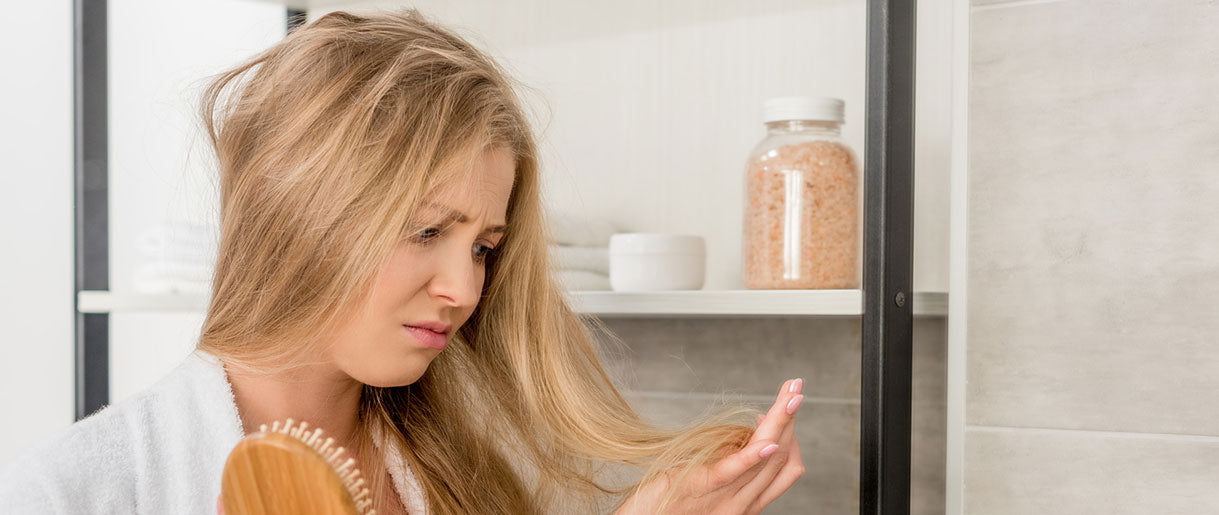

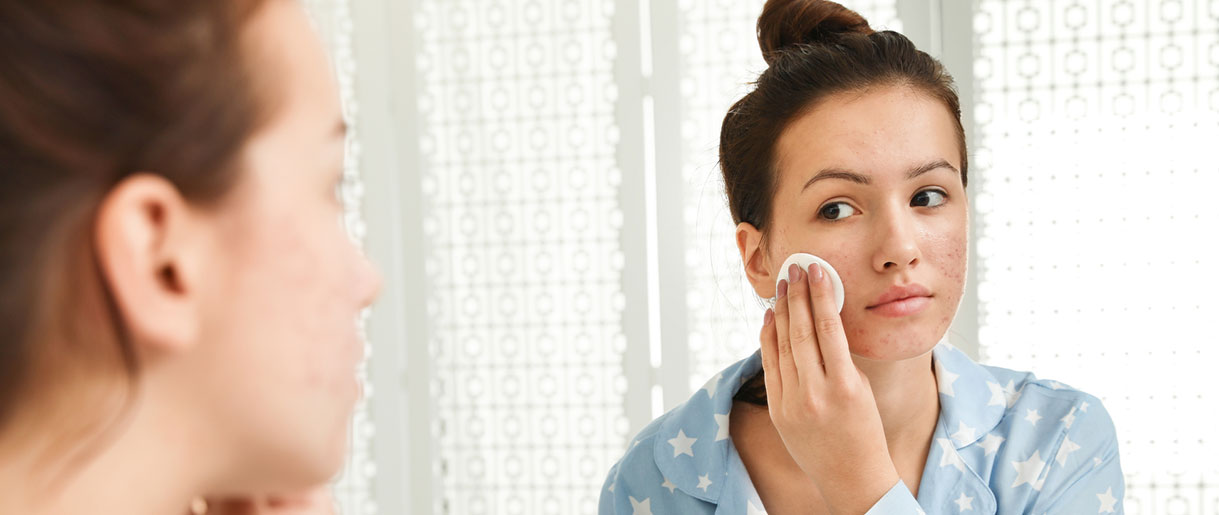
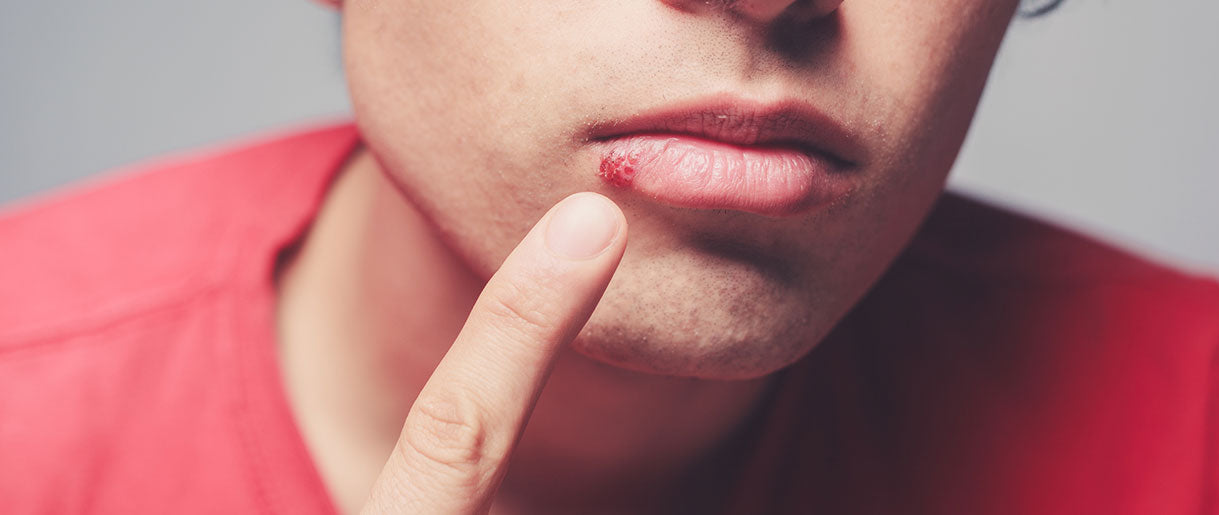
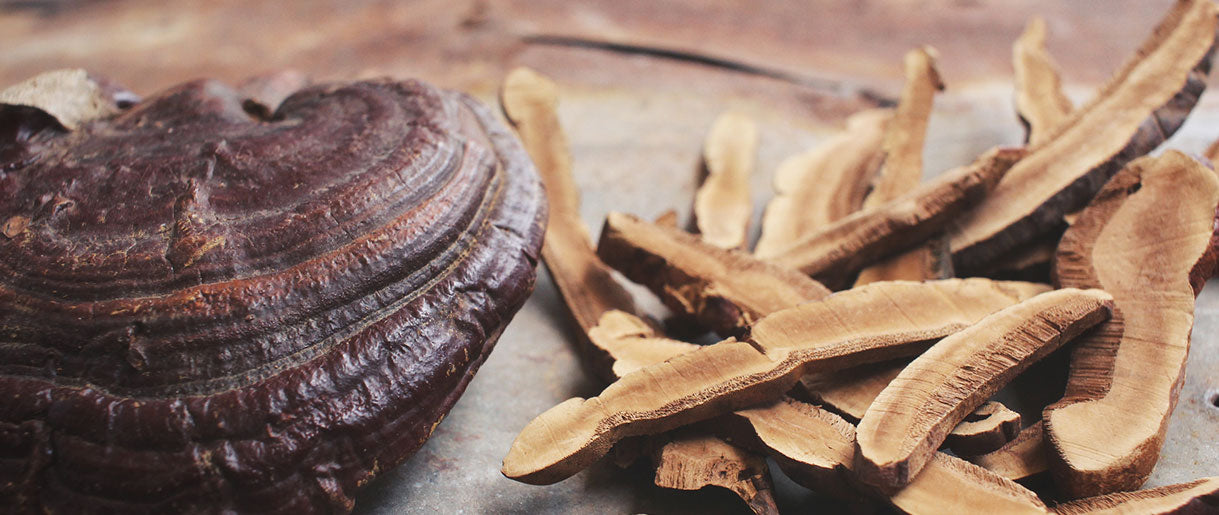
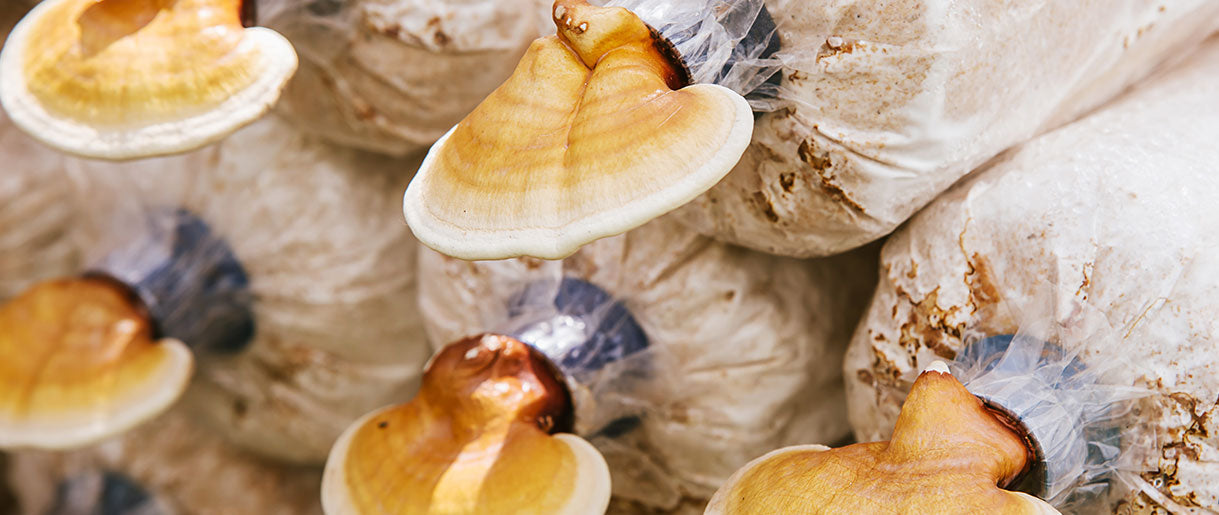
Let Us Know Your Comments